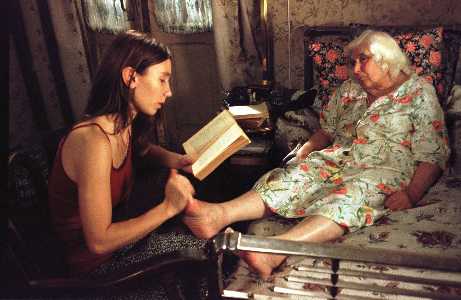
Due to a Netflix accident, we’re watching Depuis qu’Otar est parti again. We’ve not dropped Netflix entirely, even though it’s gotten a lot more difficult to get Russian films from them. So many are now marked “short wait,” “very long wait,” and “unavailable.” We hung on to the subscription so Myra can get some English-language movies while I get Russian ones from Memocast. But the movies Myra had at the top of our queue were also unavailable, and somehow Otar was next in line. This is not at all a disappointment.
Myra enjoys watching a lot of the Russian or other non-English movies me, but usually only watches them one time. I watch them multiple times if they’re good for language-learning, but Myra usually finds something else to do the 2nd or 3rd time through. Occasionally she’ll watch one twice. This one she’s watching a 3rd time — perhaps a first for her. It’s that good.
I’ve been trying to figure out why I like it so much. In my mind I put it in the same category as Vozvrashcheniye. Anna Lawton in one of her books referred to “slice of life” films. Maybe this one and Vozvrashcheniye could be categorized that way.
Wikipedia says this about slice-of-life stories:
A slice of life story is a category for a story that portrays a “cut-out” sequence of events in a character’s life. It may or may not contain any plot progress and little character development, and often has no exposition, conflict, or denouement, with an open ending. It usually tries to depict the every-day life of ordinary people, sometimes with fantasy or science fiction elements involved. The term slice of life is actually a dead metaphor: it often seems as if the author had taken a knife and “cut out” a slice of the lives of some characters, without concern for narrative form.
But these films do have some plot progress, character development, conflict, etc. Maybe the thing is that they don’t try to do too much of any of these elements. They tell us about people and relationships, but don’t try to tell more than movies are capable of telling. Some of Tarkovsky’s work, great as it is, suffers from trying to do more than is possible to do with film, IMO. His work becomes overly symbolic, because how else can you use a camera to deal with such grand topics?
It’s not that the makers of Otar and Vozvrashcheniye were slackers. It’s obvious that an enormous amount of attention to detail and nuance went into them. The acting is excellent throughout. And because their reach does not exceed their grasp, they end up being great works of art.
[Sunday afternoon spelling correction]